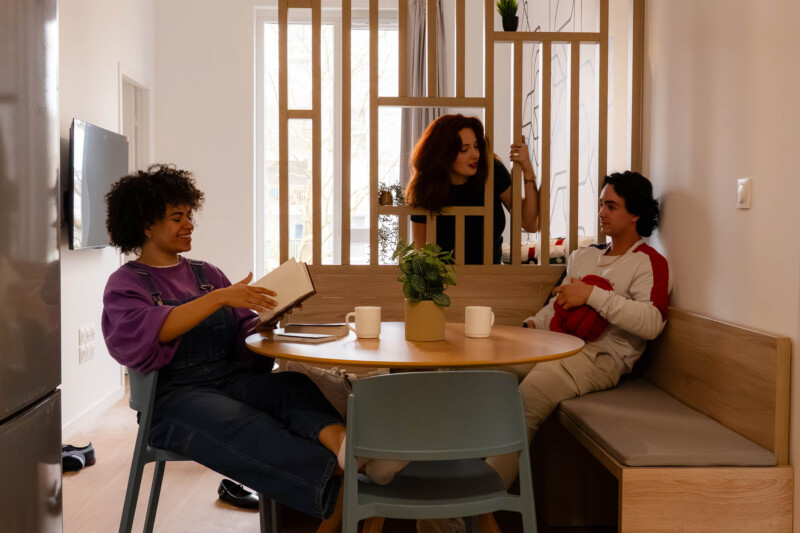Student Budget: How Much to Give to Live in 2025
You’re moving into your first apartment and wondering: how much money does a student need to live serenely throughout their studies? Or maybe you’re a parent trying to assess how much support to provide a student?

Will the €600 you estimated be enough ? Will you be able to afford leisure activities, or will your expenses leave you with nothing but pasta on the menu ? Don’t worry—you’re not alone. This guide will serve as your compass to take stock.
We’ll review each monthly expense category, estimate the average amount needed to cover your essentials, help you set up your own budget, and introduce the available financial aid.
Breaking Down the Student Budget: Recurring Monthly Expenses
⚠️ To properly gauge the impact of location, we compare the expenses of a student in Paris (the most expensive city) VS those of a student in Limoges, often cited among the most affordable cities.
Expense No. 1: Housing
Housing is by far the largest share of your monthly budget. Whether you choose a shared apartment, a studio, or a student residence, rent often accounts for more than half your expenses. You should also plan for:
- building charges (water, electricity, heating, and maintenance of common areas)
- electricity and internet when not included in the charges
- mandatory renters insurance
- the security deposit, generally equal to one or two months’ rent/fees.
The rates below correspond to renting a private studio or T1 (private rental market) and include charges unless otherwise stated.
| Category | Paris (most expensive city) | Limoges (affordable city) | Explanations |
|---|---|---|---|
| Average price of a private studio | ≈ €915/month | ≈ €379/month | According to UNEF and LocService, the average studio price reaches €915 in the capital (see the ranking of the most expensive cities) versus €385 in Limoges. |
| Utilities (water, electricity, internet, etc.) | ≈ €110–€170/month | ≈ €90–€140/month | Building charges (€30–€50), electricity (€40–€60), internet subscription (€30–€50), and renters insurance (~€10/month) total about €110 to €170. |
| Total housing (rent + utilities) | ≈ €1,025–€1,085/month | ≈ €470–€520/month | Sum of average rent and utilities. |
💡 Tip: some student residences like UXCO Student offer “all-inclusive” packages (water, electricity, internet). This simplifies budgeting and avoids nasty surprises.
Expense No. 2: Food
Food costs can climb quickly, especially in large cities.
| Category | Paris (most expensive city) | Limoges (affordable city) | Explanations |
|---|---|---|---|
| Food (groceries, meals) | ≈ €250–€300/month | ≈ €200–€250/month | Sciences Po notes that in Paris you should plan about €250–€300 for food (see budget for studies, while the University of Limoges recommends €200 per month. |
💡 Advice: cook as much as possible, buy in bulk, favor markets, and take advantage of social pricing at CROUS. University restaurants offer meals at €3.30 (or €1 for scholarship students), which reduces expenses.
Expense No. 3: Tuition Fees and Learning Materials
Tuition fees vary widely depending on the institution (public or private). Don’t forget ancillary costs: books, photocopies, specialized equipment.
| Category | Average estimate (little variation between cities) | Explanations |
|---|---|---|
| Tuition averaged per month (excluding private grandes écoles) | ≈ €20–€30/month | In public universities, annual tuition for 2025–2026 is €178 for a bachelor’s and €254 for a master’s. The Student and Campus Life Contribution (CVEC) is €105 per year. Averaged over 12 months, that’s about €20 to €30 per month. |
| Learning materials (books, supplies, printing) | ≈ €30–€60/month | A Proxxie survey estimates €300–€500 per year for materials and printing (see real student life expenses). Averaged over 12 months, that’s about €30 to €60. |
| Total (tuition + materials) | ≈ €50–€90/month | LThe total varies depending on whether you buy new or second-hand books and on your program (some fields require costly equipment). |
Expense No. 4: Transport and Leisure Activities
Getting around and enjoying activities is essential for balance. Fortunately, most French cities offer reduced student fares. Outings (cinema, culture, sports, subscriptions, etc.) are crucial for morale, so it’s useful to set aside a specific envelope.
| Category | Paris (most expensive city) | Limoges (affordable city) | Explanations |
|---|---|---|---|
| Transport (monthly student pass) | ≈ €31/month with the Imagine R pass (€374.40 per year for under-26s). For those over 26, the Navigo Pass costs ≈ €88.80/month. | ≈ €8–€10/month (STCL annual pass around €100 plus €10 card fee). | The Imagine R card provides unlimited travel in Île-de-France. In Limoges, public transport passes are particularly affordable. |
| Leisure (outings, culture, sports) | ≈ €100–€150/month | ≈ €80–€120/month | Sciences Po suggests budgeting €100–€150/month for culture and activities in the capital. In less expensive cities, €80–€120 generally suffices. |
| Total transport & leisure | ≈ €130–€240/month | ≈ €90–€130/month | This range accounts for age (under or over 26) and lifestyle. |
💡 Advice: get an international student card (ISIC) or use discounts offered by student banks to secure reduced fares on transport, museums, cinemas, and sometimes even groceries.
Total Monthly Costs
Adding the previous estimates yields:
- Capital city: ≈ €1,500–€1,650/month
- Limoges: ≈ €950–€1,100/month
💡 Good to know: housing often represents over 50% of monthly expenses in smaller cities and can climb to 70% in the capital. Choosing your city wisely is crucial.
What Monthly Amount Does a Student Need to Live Decently?
The Current Average Budget: Students’ Financial Reality
According to Sofinscope 2024 from the Crédit Agricole group, students have an average of €628 per month to cover day-to-day expenses (excluding housing and tuition). This budget varies by situation: it drops to €531 for students without a job and rises to €901 for those with regular work. One in two students considers this budget insufficient to fully enjoy student life.
The Ideal Monthly Budget
The same study reveals that students estimate they would need about €1,218 per month to live properly, €590 more than their actual budget. This amount allows for leisure activities, better food, more comfortable housing, and a small emergency savings buffer.
Managing Your Finances: A Guide to Lighten Your Budget
Having a budget is one thing; sticking to it is another! Financial management is a crucial skill you’ll develop during your studies.
How to set up your monthly study budget:
- List your income: scholarships, parental support, student job wages, aid. This is your total available sum.
- Estimate your fixed expenses: housing (rent, charges, insurance), tuition (averaged over 12 months), phone/internet plan, transport.
- Adjust your variable expenses: food, leisure activities, health, bank fees, unforeseen costs.
- Calculate your available balance: income minus fixed and variable expenses. This balance must be positive! If not, adjust your variable expenses.
- Organize your finances: use budgeting apps that let you visualize your spending and never exceed the amount allocated to each category.
Financial Aid for Students: Essential Support for Your Studies in France
You can’t rely solely on your parents to cover your needs! Fortunately, in France many types of aid exist to support students.
Housing Aid (APL) and Student Scholarships
- APL (Aide personnalisée au logement): the must-have housing benefit. The amount depends on rent, your income (or your parents’), and your city.
- CROUS scholarships: if your financial situation warrants it, the university scholarship is the most valuable aid.
Other Aid: Health, Transport, and Student Jobs
- Health insurance aid: depending on your income, you may be eligible for a reduced-rate complementary health plan (Complémentaire Santé Solidaire).
- Local aid: regions, departments, or cities often offer specific assistance (transport, housing, culture). Check with the city hall where you study.
- Student employment: finding a job (civic service, part-time) is a good way to top up your income and gain financial independence.
Key Takeaways
What budget does a student need to live? There’s no single answer, but rather a range that largely depends on your city, housing, and lifestyle. Keep in mind that the ideal average is around €1,218 per month to live comfortably in France (according to Sofinscope 2025), but many students manage with much less.
The essential thing is to set up your budget properly, use available tools and financial aid, and choose your city and housing wisely.
FAQ
FAQ: Frequently Asked Questions
Students have an average of €628 per month for day-to-day expenses, ranging from €531 for those without a job to €901 for those who work.
The total needed ranges from €950 to €1,650 depending on the city and lifestyle.
Cooking and buying in bulk, choosing “all-inclusive” housing, using university restaurants at €3.30 or €1, and taking advantage of reduced fares for transport and culture can all lighten the budget.




